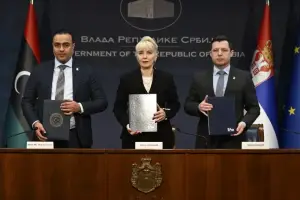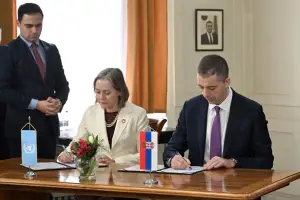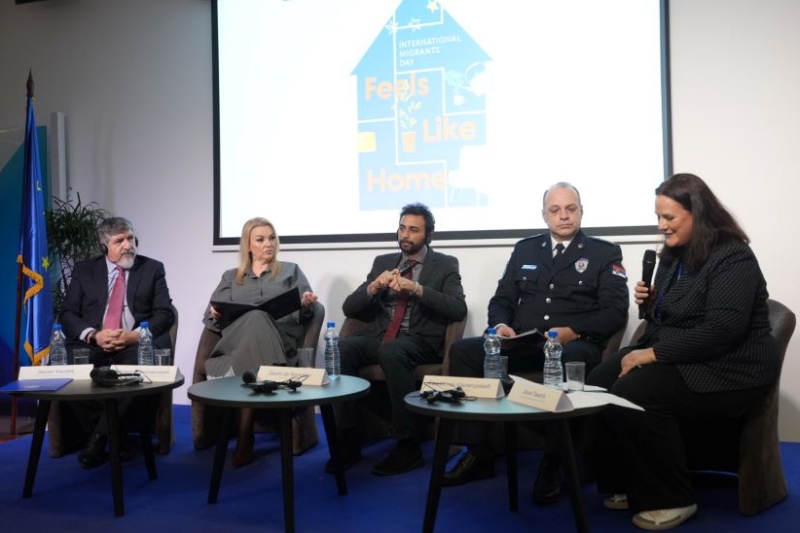The Commissariat for Refugees and Migration of the Republic of Serbia announced today, on the occasion of International Migrants Day, that this year has seen a significant decrease in the number of migrants passing through Serbia on their way to the EU, by 82%.
- Serbia
Get to know Serbia
- Citizens
Culture and science
Health services
Pension and disability insurance
- Business
Employment
Economy
- Media
- Government
- Contact
Keep in touch
Keepin touch
Whether you have a question, comment, suggestion or any problem in the purview of the government, send us your message and we will try to respond as soon as possible. If your problem is not in our purview, we will forward your message to the relevant institution.
Number of migrants in Serbia reduced by 82% compared to last year
According to the latest statistical data from the Commissariat, a total of 18,865 people have been registered in reception and asylum centres in 2024, compared to 106,742 the previous year.
Commissioner for Refugees and Migration Nataša Stanisavljević pointed out that Serbia has shown humanity and readiness to care for migrants in an organised manner over the years, regardless of which country they come from, and that it will continue this policy with empathy and understanding, providing assistance to all who need it.
More than a million migrants have passed through Serbia, and adequate care and support have been a major challenge that we have successfully overcome, she said, adding that there are currently seven active reception and asylum centres in Serbia, housing 493 people.
Chief of Mission at the International Organization for Migration (IOM) in Serbia Zeynal Hajiyev stressed that Serbia, as a country located on an important route, can use migration as a potential for development through inclusive policies and international cooperation.
The IOM is working to ensure that foreign workers can exercise their rights in Serbia, in line with international standards and broader efforts to effectively address labour market needs, he stressed.
Representative of the EU Delegation to Serbia Dario Di Benedetto stated that the EU is the main supporter of Serbia in the area of migration management, including voluntary return to safe countries of origin.
Since 2015, more than 250 million has been allocated to strengthen Serbia’s capacity to respond to the needs of migrants and refugees in line with EU and international standards, he said.
-
 Belgrade/Munich, 13 February 2026
Belgrade/Munich, 13 February 2026Serbia’s consistent commitment to principles of sovereignty, territorial integrity
-
 Belgrade/Munich, 13 February 2026
Belgrade/Munich, 13 February 2026Government fully committed to meeting obligations in EU accession process
-
 Belgrade, 11 February 2026
Belgrade, 11 February 2026Ample space for advancing cooperation with Ukraine in field of education
-
 Belgrade, 11 February 2026
Belgrade, 11 February 2026Spain’s support for Serbia’s European path
-
 Belgrade, 10 February 2026
Belgrade, 10 February 2026Libya’s participation in Expo 2027 confirms strong bilateral relations
-
 Belgrade/Astana, 10 February 2026
Belgrade/Astana, 10 February 2026Potential for advancing cooperation with Kazakhstan in multiple sectors
-
 Belgrade, 10 February 2026
Belgrade, 10 February 2026Serbia fully committed to implementation of reforms
-
 Belgrade, 9 February 2026
Belgrade, 9 February 2026Partnership with Romania in solving issues of importance to citizens
-
 Belgrade, 9 February 2026
Belgrade, 9 February 2026UN-Republic of Serbia Sustainable Development Cooperation Framework 2026-2030 signed
-
 Belgrade, 9 February 2026
Belgrade, 9 February 2026Support of neighbouring countries of great importance for Serbia’s European integration process

